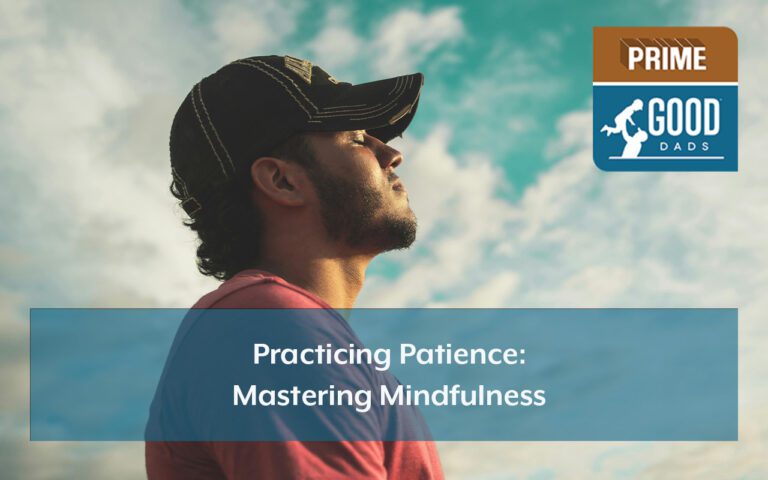This week on the Prime Good Dads blog, we’re continuing our discussion on the benefits of practicing patience–both as a Prime driver and as a father. In case you missed it, last time on the blog Prime driver Michael Johnson shared some of his strategies for practicing patience in relation to self-control.
This week, we’re focusing on mindfulness. What is mindfulness exactly? Does it depend on the person? How can practicing it help improve our patience?
Prime driver of nearly eight years Charles Smith provides his own insights into what mindfulness looks like for him. A father to six adult children and 11 grandchildren (with a 12th on the way), he has plenty of experience when it comes to taking a step back and analyzing a situation before reacting. Through the ups and downs of life, consider how mindfulness can improve your ability to be patient.
Mindfulness is related to awareness; patience is an active practice
To Charles, mindfulness is “being aware of perhaps all the things that are going on in a particular situation.” He says a lot of it has to do with an awareness of other people; you can tell a lot about someone based on their mannerisms and tone.
“Mindfulness is being aware of as many things as possible,” he said.
Charles stressed that patience isn’t simply something that comes naturally; you have to practice it frequently.
“Being patient is an active thing. You don’t just wake up patient,” he said.
Charles compared patience to marriage: you have to work on it every day.
“Living with someone who doesn’t have to live with you is one of the hardest things,” he admitted. “Butterflies you felt the first time you met them aren’t the same. You have to learn to be in a relationship with someone. I adore my wife; we make sure we have our needs met. At the end of the day, (we’re) just working out the details. Be mindful of all the things that are going on.”
Addressing different feelings and obstacles in life is a continuous practice
The life of an over-the-road father is full of unpredictable obstacles, according to Charles, who described those obstacles as “constant and ongoing.”
“What was going on yesterday is different from today,” he said. “That’s true (of) personal relationships (and of) being on the road.”
A variety of factors might require you to be flexible, like bad weather, truck maintenance or frequently changing family situations. Taking a step back and being mindful of these changes can help you tackle problems head on. However, there will be times where you forget to simply take a step back, and that can lead to even more potential problems.
“Sometimes you’re not as mindful as you can be, and you realize after that happened that you could have handled it differently,” Charles admitted.
Self-reflection is a part of personal growth
Charles compared the idea of self-reflection to when drivers first obtain their CDL. Learning to back up a big rig is one of the most important skills to learn as a Prime driver–and one of the trickiest. It’s a skill that requires time, practice and patience.
Even when you get it right, Charles stressed the importance of asking: “What did I do so that I can do it again?” In the same vein, if you did something wrong, it’s a good idea to reevaluate the situation and figure out how to finish the job correctly.
“You can’t grow if you don’t stop and take a look if something did or didn’t work out the way you wanted it to,” he said.
Checking in on your thoughts and feelings can help improve how you handle difficult situations
For Charles, time is one of the best tools for practicing mindfulness and self-reflection. He mentioned a problem that recently happened to him on the job, a last-minute change in the load. He admitted the situation made him pretty mad.
Charles used the phrase “truck thoughts,” or: “things that you wouldn’t say in public or with other people around.” These can either be out loud or in your head, but it’s a way for him to sort through a situation by cooling down and giving it some time.
“I was able to talk to my fleet manager and work through it,” he said. “I’m still not happy, but I’m not damaging that relationship because he’s not catching the heat I felt.”
Finding the right people to whom you can vent is also an important strategy. Charles said his wife, Elisabeth, is someone he can have those conversations with, because “she understands me.”
Find methods for improving mindfulness, such as prayer, meditation or deep breathing
Charles is a man of faith: prayer is a method he uses for self-improvement and mindfulness.
“In our faith, we talk about ‘please make me patient, God.’ God doesn’t just make you patient; he gives you opportunities to be patient.”
It’s easy to see how prayer is a useful method for finding focus and peace, but even if faith isn’t a part of your life, Charles advised taking a step back and taking a deep breath.
“Sometimes you’re in a situation where you’re excited,” he said. “Take a moment, breathe deep and let the adrenaline and emotions aside help you to be mindful and deal with a situation in a more rational manner.”
Lead by example
When it comes to dads encouraging their kids to be both mindful and patient, Charles stressed that dads must live it: Practice what you preach and lead by example.
“It’s far easier to get someone to do something when they see you doing it also,” he said. “If you yell at (your kids) to be patient and wait for something, but they never see you be patient and wait for something, how can you expect them to be patient? The best teacher is often example.”
Final Words
Charles admitted that sometimes practicing patience and mindfulness is easier said than done. But he always tries to be aware of what’s going on around him, whether it’s work-related or personal. He says he also finds it helpful to remind himself that others are encountering life stressors, too.
“Whenever you meet someone, you don’t know everything about them or what’s going on through their head,” he said.
Charles said it’s important that we all remember the golden rule: Treat others the way you want to be treated.
For more resources on improving fatherhood skills, visit the Good Dads website or dive into some of our latest podcast episodes.
Author
-

Dora joined the Good Dads team in 2024 and has a Bachelor's degree in journalism with a minor in creative writing at Missouri State University. She grew up with a truck driving father and loves reading, writing and anything related to theater.
View all posts

